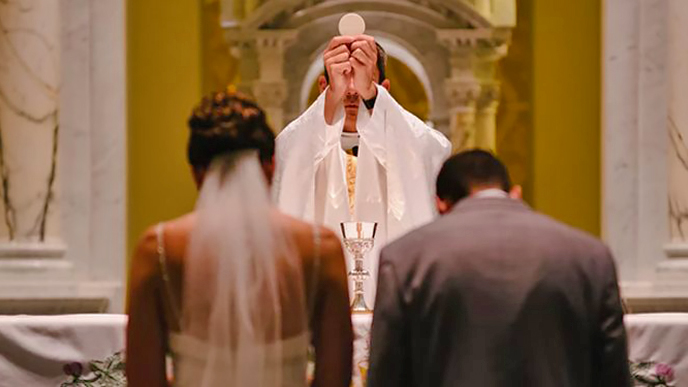
Today’s reflection verse from the Gospel of John recounts the Wedding at Cana and the first miracle of Jesus’ ministry. This naturally draws us into the nature of two people coming together in the sacrament of marriage, where we see them as a sacred sign, a hint, a sacrament of Christ’s love for the Church. Bishop Robert Barron writes that it is a peculiarity of Catholic theology that a couple exchanging vows at their wedding Mass do not so much receive a sacrament as they become a sacrament. Everyone gathered in the church that day believed that these two people coming together was not a function of dumb chance; rather, it was the consequence of God’s active providence. God wanted them to find their salvation in each other’s company, which is to imply that God wanted them, as a couple, to carry out his salvific will. When the authors of the Old Testament wanted to express the faithful, life-giving, and intense love of God for the world, they rather naturally turned to the trope of marriage. The manner in which married partners give themselves to one another completely, passionately, procreatively, in season, and out is the supreme metaphor for God’s gracious manner of being present to his people. Thus, the prophet Isaiah, in a statement of breathtaking audacity, says to the people of Israel, “Your builder (God) wants to marry you.” Every religion or religious philosophy will talk about obeying God, honoring God, and seeking after God, but it is a unique conviction of Biblical religion that God is seeking us, even to the point of wanting to marry us, to pour out his life for us without restriction. At a first-century Jewish wedding, it was the responsibility of the bridegroom to provide the wine. This explains why, upon tasting the water-made wine, the steward came directly to the groom with his puzzled observation: “Usually people serve the best wine first and then later a lesser vintage, but you have saved the best wine for last.” In changing water into wine, Jesus was, in fact, acting as the definitive bridegroom, fulfilling the prophecy of Isaiah that Yahweh would indeed come to marry his people. This is why St. Paul could speak of the love of husband and wife as a great “mystery,” that is to say, a sacred sign that speaks of Christ’s love for his body, the Church. Brides and grooms in the ordinary sense symbolically evoke the Groom and the Bride, and the great wedding banquet is re-presented sacramentally at every Mass when Christ provides not ordinary wine but his very blood to drink. So when two wonderful young people are in love, that’s reason enough to rejoice. But they are also living symbols of the Bridegroom’s ecstatic love for his Bride, the Church, that is a reason, in the very deepest sense, to give thanks.
